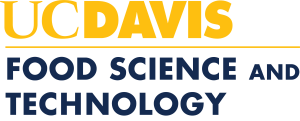Program outcomes
Program outcomes are stated as general program objectives for students graduating with a B.S. in Food Science with either option and are described below.
Program Objectives for the Food Science Undergraduate Curriculum
- Develop effective communication skills. Graduates will be able to:
- Write clear and concise technical reports
- Read for content and quality of literature in the field
- Communicate clear and concise technical presentations and data
- Improve work based on constructive criticism
- Develop higher cognitive skills. Graduates will be able to:
- Apply the scientific method to food science problems
- Apply quantitative reasoning skills to food science data
- Apply critical thinking and analytical evaluation to contemporary food science information and literature
- Apply principles from general chemistry, biology, physics, statistics, and mathematics to food science problems
- Cultivate the virtues as outlined in the UC Davis Principles of Community. Graduates will be able to:
- Value diversity of backgrounds and opinions.
- Understand the importance of responsibility, dependability, punctuality, courtesy, sensitivity, respect for others, and effort in the work place.
- Commit to the highest standards of professional integrity and ethical values.
- Develop focus and depth in the food science discipline through competency in the following core knowledge areas:
- Food chemistry and analysis. Graduates will be able to:
- Know the chemistry underlying the properties and reactions of various food components
- Have sufficient knowledge of food chemistry to control reactions in foods.
- Know the major chemical reactions that limit shelf life of foods.
- Use the laboratory techniques common to basic and applied food chemistry.
- Know the principles behind analytical techniques associated with food.
- Be able to select the appropriate analytical technique when presented with a practical problem.
- Demonstrate practical proficiency in a food analysis laboratory.
- Food safety and microbiology. Graduates will be able to:
- Identify the important pathogens and spoilage microorganisms in foods and the conditions under which they will grow.
- Identify the conditions under which the important pathogens are commonly inactivated, killed or made harmless in foods.
- Utilize laboratory techniques to identify microorganisms in food.
- Know the principles involving food preservation via fermentation processes.
- Know the role and significance of microbial inactivation, adaptation and environmental factors (i.e., aW, pH, temperature) on growth and response of microorganisms in various environments.
- Identify the conditions, including sanitation practices, under which the important pathogens and spoilage microorganisms are commonly inactivated, killed or made harmless in foods.
- Food Processing. Graduates will be able to:
- Describe the source and variability of raw food material and their impact on food processing operations.
- Explain the spoilage and deterioration mechanisms in foods and methods to control deterioration and spoilage.
- List the principles that make a food product safe for consumption.
- Describe the transport processes and unit operations in food processing as demonstrated both conceptually and in practical laboratory settings.
- Operate the mass and energy balances for a given food process.
- Describe the unit operations required to produce a given food product.
- Explain the principles and current practices of processing techniques and the effects of processing parameters on product quality.
- Explain the properties and uses of various packaging materials.
- Describe the basic principles and practices of cleaning and sanitation in food processing operations.
- Identify the requirements for water utilization and waste management in food and food processing.
- Applied Food Science. Graduates will be able to:
- Apply and incorporate the principles of food science in practical, real-world situations and problems.
- Demonstrate ability to use computers to solve food science problems.
- Apply statistical principles to food science applications.
- Apply the principles of food science to control and assure the quality of food products.
- Explain the basic principles of sensory analysis.
- Give examples of current topics of importance to the food industry.
- Identify government regulations required for the manufacture and sale of food products.
- Develop leadership skills. Graduates will be able to:
- Engage in collaborative learning
- Facilitate group projects
- Demonstrate the ability to work independently, as well as the ability to work cooperatively in teams.
- Provide leadership in a variety of situations with sensitivity to diverse backgrounds.
- Appropriately manage individual and/or group conflict.
- Prepare for lifelong learning. Graduates will be able to:
- Appreciate that information, knowledge, and technology are always evolving
- Think independently to solve problems
- Explain the skills necessary to continually educate oneself.
- Participate in ongoing, voluntary and self-motivated pursuits that supplement food science knowledge.
- Food chemistry and analysis. Graduates will be able to:
The Food Science major is an outcome-based curriculum. Learning outcomes are given on the pages identified by course number on the left.
